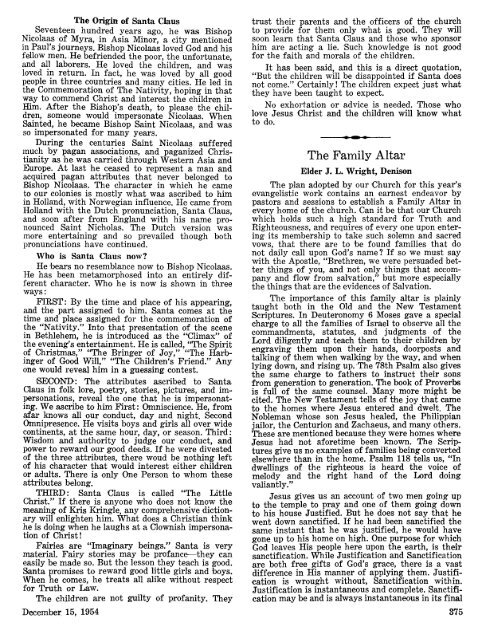Covenanter Witness Vol. 53 - Rparchives.org
Covenanter Witness Vol. 53 - Rparchives.org
Covenanter Witness Vol. 53 - Rparchives.org
You also want an ePaper? Increase the reach of your titles
YUMPU automatically turns print PDFs into web optimized ePapers that Google loves.
come."valiantly."salvation,"The Origin of Santa ClausSeventeen hundred years ago, he was BishopNicolaas of Myra, in Asia Minor, a city mentionedin Paul's journeys. Bishop Nicolaas loved God and hisfellow men. He befriended the poor, the unfortunate,and all laborers. He loved the children, and wasloved in return. In fact, he was loved by all goodpeople in three countries and many cities. He led inthe Commemoration of The Nativity, hoping in thatway to commend Christ and interest the children inHim. After the Bishop's death, to please the children, someone would impersonate Nicolaas. WhenSainted, he became Bishop Saint Nicolaas, and wasso impersonated for many years.During the centuries Saint Nicolaas sufferedmuch by pagan associations, and paganized Christianity as he was carried through Western Asia andEurope. At last he ceased to represent a man andacquired pagan attributes that never belonged toBishop Nicolaas. The character in which he cameto our colonies is mostly what was ascribed to himin Holland, with Norwegian influence. He came fromHolland with the Dutch pronunciation, Santa Claus,and soon after from England with his name pronounced Saint Nicholas. The Dutch version wasmore entertaining and so prevailed though bothpronunciations have continued.Who is Santa Claus now?He bears no resemblance now to Bishop Nicolaas.He has been metamorphosed into an entirely different character. Who he is now is shown in threeways:FIRST: By the time and place of his appearing,and the part assigned to him. Santa comes at thetime and place assigned for the commemoration ofthe "Nativity." Into that presentation of the scenein Bethlehem, he is introduced as the "Climax" ofthe evening's entertainment. He is called, "The Spiritof Christmas," "The Bringer of Joy," "The Harbinger of Good Will," "The Children's Friend." Anyone would reveal him in a guessing contest.SECOND: The attributes ascribed to SantaClaus in folk lore, poetry, stories, pictures, and impersonations, reveal the one that he is impersonating. We ascribe to him First : Omniscience. He, fromafar knows all our conduct, day and night. SecondOmnipresence. He visits boys and girls all over widecontinents, at the same hour, day, or season. Third :Wisdom and authority to judge our conduct, andpower to reward our good deeds. If he were divestedof the three attributes, there woud be nothing leftof his character that would interest either childrenor adults. There is only One Person to whom theseattributes belong.THIRD: Santa Claus is called "The LittleIf there is anyone who does not know theChrist."meaning of Kris Kringle, any comprehensive dictionary will enlighten him. What does a Christian thinkhe is doing when he laughs at a Clownish impersonation of Christ!beings."Fairies are "Imaginary Santa is verymaterial. Fairy stories may be profance they caneasily be made so. But the lesson they teach is good.Santa promises to reward good little girls and boys.When he comes, he treats all alike without respectfor Truth or Law.The children are not guilty of profanity. TheyDecember 15, 1954trust their parents and the officers of the churchto provide for them only what is good. They willsoon learn that Santa Claus and those who sponsorhim are acting a lie. Such knowledge is not goodfor the faith and morals of the children.It has been said, and this is a direct quotation,"But the children will be disappointed if Santa doesnot Certainly! The children expect just whatthey have been taught to expect.No exhortation or advice is needed. Those wholove Jesus Christ and the children will know whatto do.The Family AltarElder J. L. Wright, DenisonThe plan adopted by our Church for this year'sevangelistic work contains an earnest endeavor bypastors and sessions to establish a Family Altar inevery home of the church. Can it be that our Churchwhich holds such a high standard for Truth andRighteousness, and requires of every one upon entering its membership to take such solemn and sacredvows, that there are to be found families that donot daily call upon God's name? If so we must saywith the Apostle, "Brethren, we were persuaded better things of you, and not only things that accompany and flow from but more especiallythe things that are the evidences of Salvation.The importance of this family altar is plainlytaught both in the Old and the New TestamentScriptures. In Deuteronomy 6 Moses gave a specialcharge to all the families of Israel to observe all thecommandments, statutes, and judgments of theLord diligently and teach them to their children byengraving them upon their hands, doorposts andtalking of them when walking by the way, and whenlying down, and rising up. The 78th Psalm also givesthe same charge to fathers to instruct their sonsfrom generation to generation. The book of Proverbsis full of the same counsel. Many more might becited. The New Testament tells of the joy that cameto the homes where Jesus entered and dwelt. TheNobleman whose son Jesus healed, the Philippianjailor, the Centurion and Zachaeus, and many others.These are mentioned because they were homes whereJesus had not aforetime been known. The Scriptures give us no examples of families being convertedelsewhere than in the home. Psalm 118 tells us, "Indwellings of the righteous is heard the voice ofmelody and the right hand of the Lord doingJesus gives us an account of two men going upto the temple to pray and one of them going downto his house Justified. But he does not say that hewent down sanctified. If he had been sanctified thesame instant that he was justified, he would havegone up to his home on high. One purpose for whichGod leaves His people here upon the earth, is theirsanctification. While Justification and Sanctificationare both free gifts of God's grace, there is a vastdifference in His manner of applying them. Justification is wrought without, Sanctification within.Justification is instantaneous and complete. Sanctification may be and is always instantaneous in its final375
















